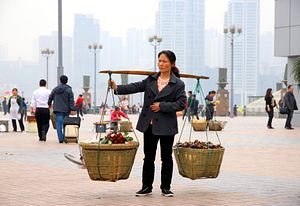On September 26 Somini Sengupta of The New York Times wrote that Chinese President Xi Jinping would be hosting a UN women’s rights summit, adding, “never mind … that China imprisoned five prominent feminist activists this year.”
Hillary Clinton retweeted the article the following day, remarking, “Xi hosting a meeting on women’s rights at the UN while persecuting feminists? Shameless.” Right on cue, Party fundamentalists, Xi sycophants and wumao everywhere exploded with rage. Or as Emily Rauhala of The Washington Post put it, “the Internet went bananas.”
The Global Times claimed Clinton’s remark was the kind of demagoguery one might expect from Donald Trump. However, demagoguery is an appeal to one’s prejudices — what’s prejudiced about criticizing Xi for hosting a women’s rights summit while persecuting women? Is it that women in China aren’t as persecuted as Clinton might like to think?
Well, according to women’s rights activist Xiao Meili, “in China today, women face widespread discrimination at work; many companies refuse to even hire women. Sexual harassment is commonplace. Domestic violence is pervasive.”
Also, according to the OECD’s Social Institutions & Gender Index (SIGI), China’s treatment of women is mediocre, earning a 2014 SIGI value of 0.131. The lower the value the better, so for example India has a value of 0.265 while France has a value of 0.0034. Regarding China, important features are a bias to prefer sons and lack of physical integrity.
Son bias in China is the world’s worst, but according to SIGI, China has taken steps to address the issue by “banning the use of ultrasounds to determine the sex of a fetus, and sex-selective abortions, as well as mistreatment and abandonment of female infants, and discrimination against women who give birth to girls.”
China is also making strides concerning women’s physical integrity. For instance, the Marriage Law of 2001 banned domestic violence. Then in 2011, Florida-native Kim Lee posted images of her battered face, claiming her husband Li Yang, owner of Crazy English, had savagely choked her and repeatedly smashed her head into the floor. Li confessed, but later commented, “Our problem involves character and cultural differences.” He added, “I never thought she would make it public since it’s not Chinese tradition to expose family conflicts to outsiders.”
It’s terrifying to imagine how widespread Li’s perspective might be among Chinese men, particularly considering the 2013 U.N. report on domestic violence, in which a shocking 51.5 percent of Chinese male respondents openly admitted to having perpetrated physical or sexual partner violence. Think about that. If this is representative of Chinese society, it would mean that most Chinese men have at some time physically or sexually abused their partner. If that doesn’t knock you back a step, I’m not sure what would.
Thankfully, Kim Lee made legal history, winning full custody of their children and $1.9 million, and in March 2014 the first draft of a law to protect women against domestic violence was submitted to the State Council, and by late 2014 it took effect. And there’s more good news.
Professor Jude Howell of the London School of Economics notes “a new wave of activism amongst China’s young generation of women, which is taking radical action around practical issues like the shortage of female toilets and the discriminatory practices in university entrance processes.”
Furthermore, according to the 2002 report “Rising to the Top? A Report on Women’s Leadership in Asia,” within East Asia “China leads in terms of women in senior management.” The report credits this in part to Mao’s belief in the importance of women, whom he famously said “hold up half the sky.”
It will take time before the stunningly high rate of abuse toward women declines, but the wheels are in motion. However, China continues to have issues. It doesn’t help China’s image, for example, that this year’s Spring Festival Gala, the most watched television show in the world, was “spectacularly misogynistic” — a view reassuringly shared by 85 percent of those polled by Sina Weibo and, somewhat surprisingly, China Daily.
Neither did it help when images went viral last week of Kunming Airlines hostesses in overhead compartments, part of a hazing ritual of female employees, whose “consistently filed complaints” went ignored for almost five years. Often, it’s the ironies that do the most harm — such as Chinese authorities arresting the Feminist Five the day before International Women’s Day.
But what helps even less is when people react so virulently to criticism, as they did after Clinton’s remark, as if they either deny the problem or (like Li Yang) resent it being made public. Especially when some of the reactions don’t even make sense, such as the suggestions that Clinton should “let Chinese women judge for themselves.” The whole point, remember, is that when Chinese women do judge for themselves, as the Feminist Five did, they face arrest.

































